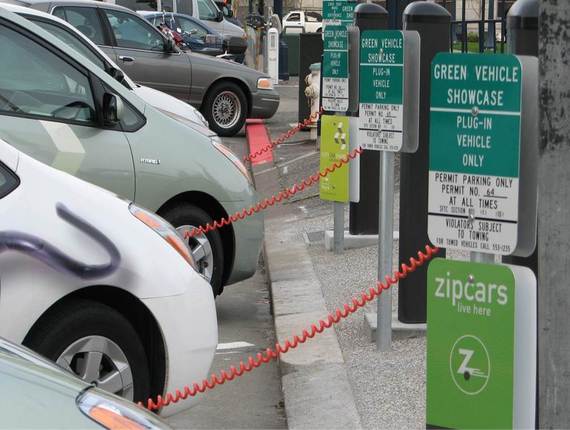This is a major step forward in the use of EV's. First, we need to make charging convenient and cheap (particularly as we see, at least right now, gas prices falling). With that, then we can eliminate much of the consumer's range anxiety and offer a driving experience not just as pleasant, but more pleasant than using fossil fuel. While saving them money and weekly/daily stops at gas stations.
We commend these states and commend all of you who buy and use plug-ins and EV's.
Some Utilities Are Making it Cheaper to Drive Electric Cars
Some utility companies are
starting to encourage consumers to make the switch to plug-in electric vehicles
(EVs). JEA, a utility company in northeastern Florida, recently began offering
to its nearly half a million household and business electricity customers a rebate of up to
$1,000 for the purchase or lease of a plug-in electric vehicle. That's
a lot of cash toward buying a car that is already significantly cheaper to fuel
than a conventional gas guzzler.
Recently, Georgia Power, the
largest utility in the peach state, announced it will invest$12 million in a
pilot program through which it will offer its residential
customers incentives of $250 (and up to $500 for businesses) if they install
certain types of EV chargers. The utility also now offers special electricity
rates for EV drivers and plans to install 50 public charging stations. The
company also provides a strong EV
web sitefor prospective and current EV owners.
In Michigan, Consumers Energy currently offers a
reimbursement of up to $2,500 to help customers cover the
purchase, installation, and wiring of a Level 2 EV charging station. If you're
an interested customer, act quickly because the program will likely expire at
the end of this year, and only 2,500 households are eligible.
San Diego Gas & Electric Company
(SDGE) offers two electricity rate options specifically for EV owners. One
uses a separate meter for the EV, and the other uses the existing meter to
provide a combined reduced rate for EV charging and typical household use. Both
plans calculate the price of electricity based on the time of day you choose to
charge your car. Through these 'time of use' programs, SDGE expects to
encourage customers to "limit daytime usage of electricity, when demand
for electricity is highest."
According to the Edison Electric
Institute, there were at least 23 electric utilities around the US that were
offering EV specific rates at the end of 2013.
Some utility companies and
agencies are way ahead (and others way behind) in promoting EVs. The
Massachusetts Department of Public Utilities is working to catch up by holding
technical conferences on a number of EV topics, including electricity rate
design for EV drivers, demand response programs, and grid planning (this is
wonky but important stuff). Ideally, they will accept public comment and create
regulatory changes that will get Massachusetts utilities into the pro-EV mix in
the near-term.
According to a 2014 report by
the Edison Electric Institute, customers are more likely to trust
their local utility than the US Department of Energy for information about EVs,
demonstrating that utilities are a crucial ally in today's EV market. In
addition to encouraging EV programs for customers, EEI has also requested that
each of its member utilities spend 5% of their annual fleet purchase budgets on
plug-in vehicles, including electric forklifts. Companies such as Pacific Gas
and Electric Company in Portland are already moving in this direction, with the
recent unveiling of the first
electric hybrid drivetrain Class 5 truck and battery powered
lift systems on bucket trucks, which eliminate the need for trucks
to idle at work sites.
Environmental advocates have a
long history of going to battle with utilities (and industry associations like
EEI) on issues related to dirty energy sources and energy efficiency programs.
Just this past summer, several Florida-based utilities presented testimony to
the Florida Public Service Commission arguing they should be allowed to roll
back energy-efficiency goals, and environmental
groups -including the Sierra Club-- have been pushing back. These
fights will surely continue.
However, EVs offer an opportunity
for agreement and collaboration among strange bedfellows. More electricity used
by customers is desirable for utility companies -even those where electricity
has been 'de-coupled' from total profits. And more consumers switching to
plug-in electric cars is sought after by environmental groups that have done
the math and found that EVs are a much cleaner choice compared to conventional
vehicles, even using electricity to charge them based on today's energy
sources. With more renewable sources of power, EVs become even cleaner over
time.
Sierra Club's online EV Guide, now updated with a short
online quiz, gives a wealth of information about EVs, including
location-specific utility incentive programs that may be available where you
plug in.
Madison Halloran contributed to this article.


No comments:
Post a Comment